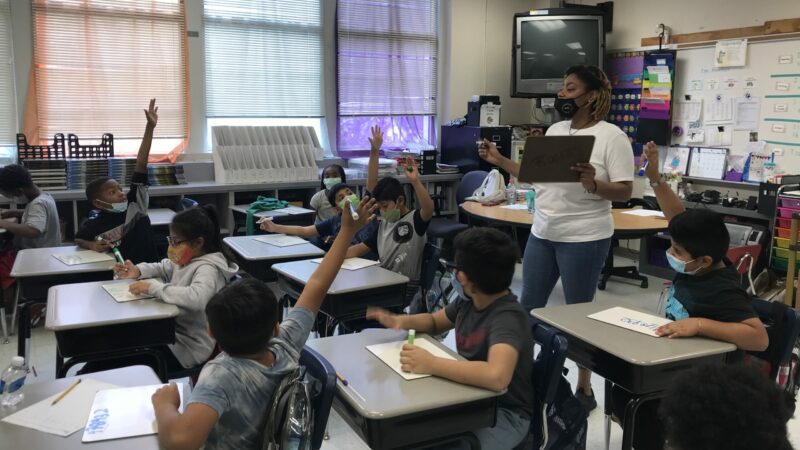It’s fall break, but these Birmingham students are staying in school
Ashley Hogan guides her fourth grade class through a math lesson at Glen Iris Elementary School during fall intersession.
This week marks the first break of the school year in Birmingham City Schools. But this fall, students have a choice to rest at home or stay in school. And at Glen Iris Elementary, around 200 of the school’s 700 students decided to stay for the week, like Ashley Hogan’s class of fourth-graders.
“Some of the students are like, ‘Can we stay? Do we have to go home?’” Hogan said.
Intersession is a new initiative the district launched for students to get extra academic support and enrichment after COVID-19 triggered a year of virtual learning. It’s a part of Birmingham City Schools’ plan for an extended school year. After every nine weeks, there is a week where students can spend half-days at school going to extracurricular classes like P.E. and music while also getting a chance to make up for missed work and get ahead academically.
“We are filling in those gaps that may have been missed from the previous year,” Hogan said. “So for us to have intersession and to continue to do this, I think it’s a great opportunity because now they’re getting back familiar with the structure of being in school and learning hands-on.”
Birmingham City Schools designed many solutions to combat learning loss and address new state guidelines, including summer literacy camps and after-school tutoring.
“We needed to do something different this year,” Superintendent Mark Sullivan said in a statement. “The past 18 months have presented challenges that could impact our students for some time, if we do not take progressive steps to help raise academic achievement and enhance their preparation for success.”
The district is putting $29.5 million of COVID-19 federal relief grants towards “learning loss” including intersession classes and other extra instruction. Glen Iris Principal Tronci Southall-Mason called these initiatives a promise to students.
“It is also important to just, I think, let the scholars know that we are all wanting them to succeed,” Southall-Mason said. “And so that’s what we’re trying to do to make sure that we address and target those students who need that additional assistance or maybe just need that enrichment.”
Birmingham City Schools is offering classes at all K-5 and K-8 schools and high school classes at select campuses. The biggest academic focus is reading skills to address new literacy guidelines from the state as well as improving math and critical-thinking skills for students.
All 25,000 students in Birmingham City Schools will go back to their regular school schedule next week.
Kyra Miles is a Report for America Corps Member reporting on education for WBHM.
Impostor uses AI to impersonate Rubio and contact foreign and U.S. officials
The State Department is warning U.S. diplomats of attempts to impersonate Secretary of State Marco Rubio and possibly other officials using technology driven by artificial intelligence.
Supreme Court allows Trump to resume mass federal layoffs for now
Justice Ketanji Brown Jackson, who was appointed to the court by President Biden, dissented.
Graphics: Where the Texas floods happened and how high the waters rose
One Guadalupe River gauge near Kerrville and Camp Mystic recorded a rise of more than 25 feet in two hours.
Haiti’s iconic Hotel Oloffson, long a cultural beacon, destroyed by gang violence
The Hotel Oloffson in Haiti's capital Port-au-Prince, long a haven for artists and writers, poets and presidents, a symbol of Haiti's troubled politics and its storied past, has been destroyed by gangs.
New books this week focus on Caitlin Clark, King Tut, and how ‘Democrats Lost America’
Plus: a new novel from Gary Shteyngart, a true story of a shipwreck, and a memoir from a wrongly incarcerated inmate who was exonerated after 28 years behind bars.
Shoes off at the airport? TSA appears to be giving the pesky rule the boot
For nearly twenty years, most air travelers in the U.S. have been required to remove their shoes when going through security. That requirement seems to be ending.








